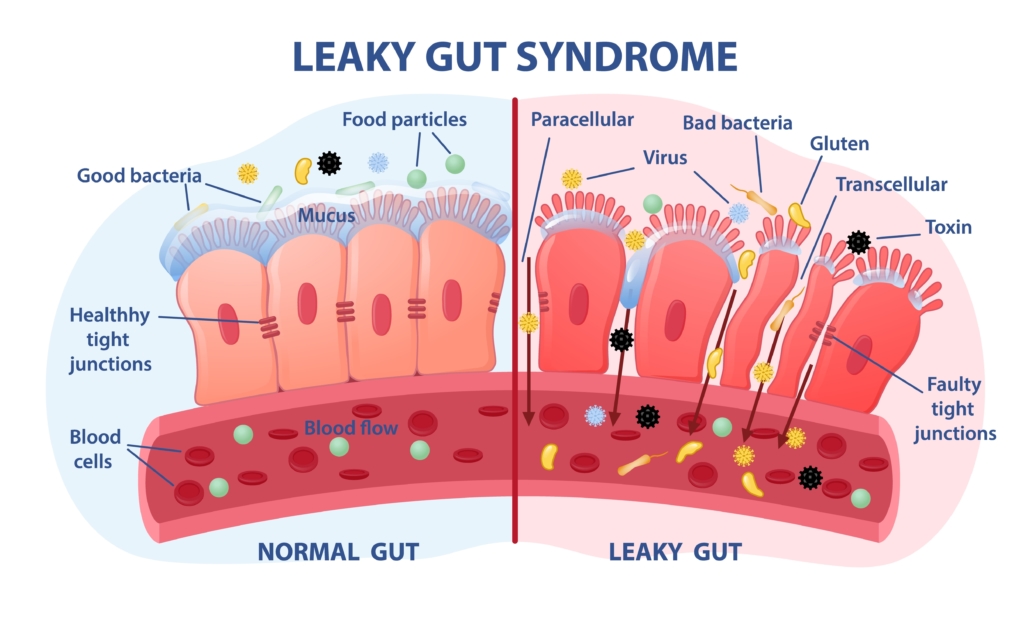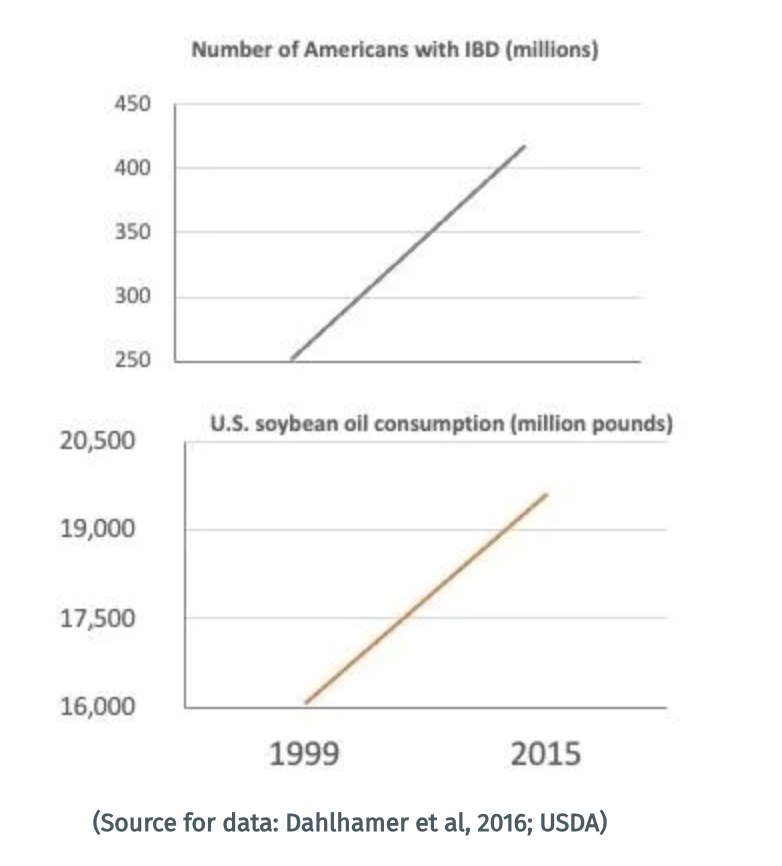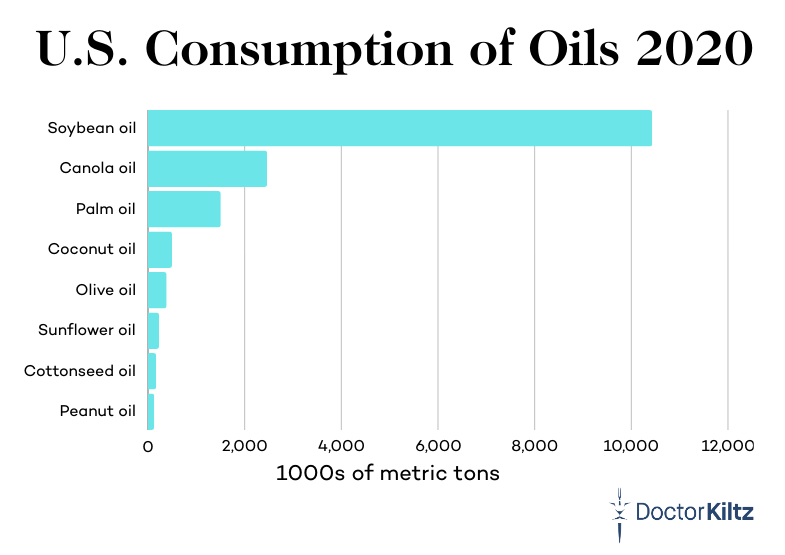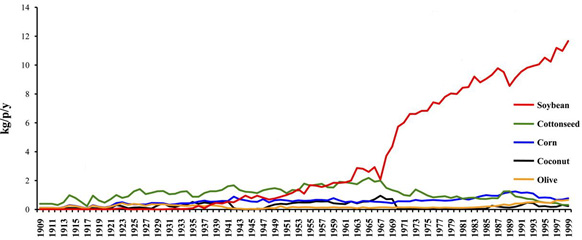We include products in articles we think are useful for our readers. If you buy products or services through links on our website, we may earn a small commission.
Is Soybean Oil Bad for You? What the Science Says

Table of Contents
- Why Are People Concerned About Soybean Oil?
- Soybean Oil is High in Linoleic Acid
- Is Soybean Oil Bad for Gut Health?
- Soybean Oil and Cancer
- Is Soybean Oil Bad for Brain and Mental Health?
- Soybean Oil is Unstable and Easily Oxidized
- Alternatives to Soybean Oil
- Is Soybean Oil Bad for You? The Bottom Line
Soybean oil is one of the most common ingredients in the standard Western diet, accounting for around 7% of all calories consumed by Americans. Yet, this “vegetable” oil is a highly processed industrial product comprised of a kind of polyunsaturated fat (linoleic acid) that a natural human diet contains very little of, leading many health experts to question if soybean oil is bad for you.
In this article, we’ll shed light on the various and alarming adverse effects of soybean oil consumption on your health. Join us on a journey through the science exploring the influence of soybean oil on inflammation, the delicate balance of omega-3 and omega-6 fatty acids, and the potential link between increasing soybean oil consumption and the rise of chronic diseases.
Is Soybean Oil Bad for You? Fast Facts
- Soybean oil is a highly processed industrial food product
- Soybean oil is high in linoleic Omega-6 polyunsaturated fatty acids (PUFA)
- In the modern Western diet, the ratio of omega 6 to omega 3 fatty acids is 15:1. In traditional human diets the ratio is closer to 1:1. The modern imbalance can promote widespread and chronic inflammation
- From 1959 to 2008, the amount of linoleic fatty acid in human body fat increased from 9.1% to 21.5%
- High consumption of soybean oil (and linoleic acid in general) has been linked to obesity, diabetes, autism, Alzheimer’s disease, anxiety, depression, ulcerative colitis, and inflammatory bowel disease (IBD)
Why Are People Concerned About Soybean Oil?
In recent years, numerous studies have refuted the popular belief among nutritionists that reducing saturated fat from animal products and increasing polyunsaturated fatty acids from “vegetable” oils improves heart health.
In fact, consuming more vegetable oil has been associated with alarmingly high rates of cancer, heart disease, neurological disorders, and all-cause mortality.
For example, the major 2013 Sydney Diet-Heart Study, separated participants into two groups. The total fat intake of both groups was the same. For one group, the primary type of fat was linoleic acid from vegetable oil and margarine. The other group got most of their fat from butter, oil, and fatty meat. Nothing else about the diets and lifestyles of the two groups was changed.
Over seven years of monitoring, the vegetable oil group had a 62% greater all-cause mortality rate.
Because soybean oil accounts for the majority of the vegetable oil that Americans consume, it has come under more scrutiny as the public and nutrition experts alike are asking, “Is soybean oil bad for you?

Soybean Oil is High in Linoleic Acid
Soybean oil is comprised of 60% polyunsaturated fatty acids and 54% of one type of PUFA called linoleic acid.
In the body, linoleic acid acts as a precursor to a molecule called arachidonic acid that causes inflammation. Arachidonic acid acts as a precursor for the creation of over twenty pro-inflammatory molecules called eicosanoids.
In traditional diets, which are comprised mainly of animal products high in omega-3 fatty acids, there is a 1:1 balance of omega-3s to omega-6s. Since omega-3s are anti-inflammatory, they counteract the effects of omega-6s.
However, in a modern “plant-based” diet loaded with processed soybean oil, the overabundance of omega-6s can promote chronic inflammatory disorders and diseases.
In 2018, researchers found that high LDL (bad) cholesterol is only associated with an increased risk of heart disease in the context of a diet high in omega-6 fatty acids.
Heart attack patients were found to have significantly more linoleic acid in their arteries than healthy patients. Furthermore, the more severe the heart attack, the greater arterial plaque buildup from omega-6 fatty acids.
The authors of the study concluded, “In summary, numerous lines of evidence show that the omega-6 polyunsaturated fat linoleic acid promotes oxidative stress, oxidized LDL, chronic low-grade inflammation and atherosclerosis, and is likely a major dietary culprit for causing CHD [congenital heart disease], especially when consumed in the form of industrial seed oils commonly referred to as ‘vegetable oils’.”
Is Soybean Oil Bad for Gut Health?
Soybean oil has been directly implicated in bowel diseases, including ulcerative colitis (UC), and inflammatory bowel disease (IBD), characterized by chronic inflammation of the large intestine.
A 2023 study found that a diet high in soybean oil encourages the growth of harmful E. coli in the gut and levels of beneficial endocannabinoids to decrease.

E. coli bacterium was found to feed off the carbon in linoleic acid. At the same time, various other beneficial bacteria were killed off by linoleic acid.
These effects on gut bacteria were found to cause the intestinal epithelial barrier to become porous, a condition known as intestinal permeability or “leaky gut.”

When the gut barrier is compromised by soybean oil, toxins can enter the bloodstream, increasing the risk of chronic inflammatory diseases like colitis.
The authors of the study highlighted a parallel between the dramatic increase in soybean oil consumption and IBS rates.

Commenting on the study, Poonamjot Deol, stated, “Our work challenges the decades-old thinking that many chronic diseases stem from the consumption of excess saturated fats from animal products, and that, conversely, unsaturated fats from plants are necessarily more healthful…While our bodies need 1-2% of linoleic acid daily, based on the paleo diet, Americans today are getting 8-10% of their energy from linoleic acid daily, most of it from soybean oil.”
Soybean Oil and Cancer
The effects of soybean oil on cancer are limited to animal studies, but the results deserve attention.
In a 2009 study, mice with implanted tumors (poor mice!) were divided into groups that were fed with different fatty acids.
The group of mice fed linoleic fatty acids suffered a 400% more aggressive spread of cancer than the rodent groups fed monounsaturated fatty acids like you find in olive oil and saturated fatty acids from red meat.
A 2010 study found that mice fed soybean oil that had been heated in a deep fryer suffered 400% greater cancer metastasis than mice fed unheated oil.
The takeaway is that soybean oil feeds cancer cells, and when it’s heated, it’s even worse.
Another study found that tumors in rats began to form once they consumed 20% of their fat in the form of linoleic acid.
Keep in mind that vegetable oils account for around 20% of fat intake on the American diet, while 37% of Americans regularly eat food cooked in vegetable oil.
To underscore the potential cancer risks of soybean oil, let’s take a look at the classic Los Angeles Veterans Administration Study.
The study split participants into two groups. One group increased the percentage of total fat intake from vegetable oil. The other (control) group didn’t change the type of fat they consumed.
Both groups consumed the same total amount of fat.
The vegetable oil group was found to be 82% more likely to die from cancer.
Interestingly, though the groups were randomly selected, the control group had twice as many heavy smokers. Yet, even with more smokers, this group had significantly fewer deaths from cancer.
Is Soybean Oil Bad for Brain and Mental Health?
A 2020 study in mice found that consuming soybean oil leads to weight gain and triggers a gene dysregulation associated with increased rates of neurological disorders, including autism, Alzheimer’s disease, anxiety, and depression.
Consuming soybean oil was also found to reduce levels of oxytocin, the hormone responsible for loving bonds.
In recent years, there has been a national focus on the need for more mental health resources. Yet, it may be the case that Americans would not be experiencing such a dramatic mental health crisis if soy and other vegetable oils were eliminated from our diets.
Interestingly, consuming meat and animal products has been routinely associated with improved mental health.
The study authors conclude, “If there’s one message I want people to take away, it’s this: reduce consumption of soybean oil”.
In another study from 2013, soybean oil in infant formula dysregulated genes in ways that were associated with inflammation and neuroendocrine, neurochemical, and insulin signaling. These factors are associated with specific autistic behaviors.
Soybean Oil is Unstable and Easily Oxidized
Because soybean oil is composed of mainly unsaturated fatty acids, it is susceptible to oxidation when stored at room temperature and when heated for cooking.
In both human and animal studies, oxidized vegetable oils have been found to damage brain and liver cells, cause widespread inflammation, and increase the risk of diabetes and cardiovascular disease.
Alternatives to Soybean Oil
The best alternatives to soybean oil are saturated (molecularly stable) animal fats like butter, ghee, and tallow.
For example, butter is composed of approximately 67% saturated fats, 29% monounsaturated fats, and 4% polyunsaturated fats.
It’s worth keeping in mind that vegetable oils like olive and avocado, which have lower PUFA content, are often adulterated with cheaper soybean oil.
One study 2022 study out of the University of California Davis, found that out of 22 domestic and internationally produced samples of avocado oil, 82% were rancid and/or mixed with other soybean and other oils. Two brands were almost 100% soybean oil!
Is Soybean Oil Bad for You? The Bottom Line
Soybean oil is the most common vegetable oil in America, and its consumption is expected to grow over the coming decades.
Unfortunately, soybean oil is also one of the most toxic substances that people unwittingly consume on a regular basis.
High in inflammatory linoleic acid, soybean oil is bad for our health in various and significant ways, including increased risk of
- obesity
- diabetes
- Autism
- Alzheimer’s disease
- Depression
- Ulcerative colitis
- IBD and intestinal permeability
- Chronic inflammation
To avoid the negative health consequences of soybean oil (and all toxic vegetable oils), we strongly recommend completely eliminating it from your diet and replacing it with the nourishing animal fats that humans have thrived on since the dawn of our species nearly two million years ago.























